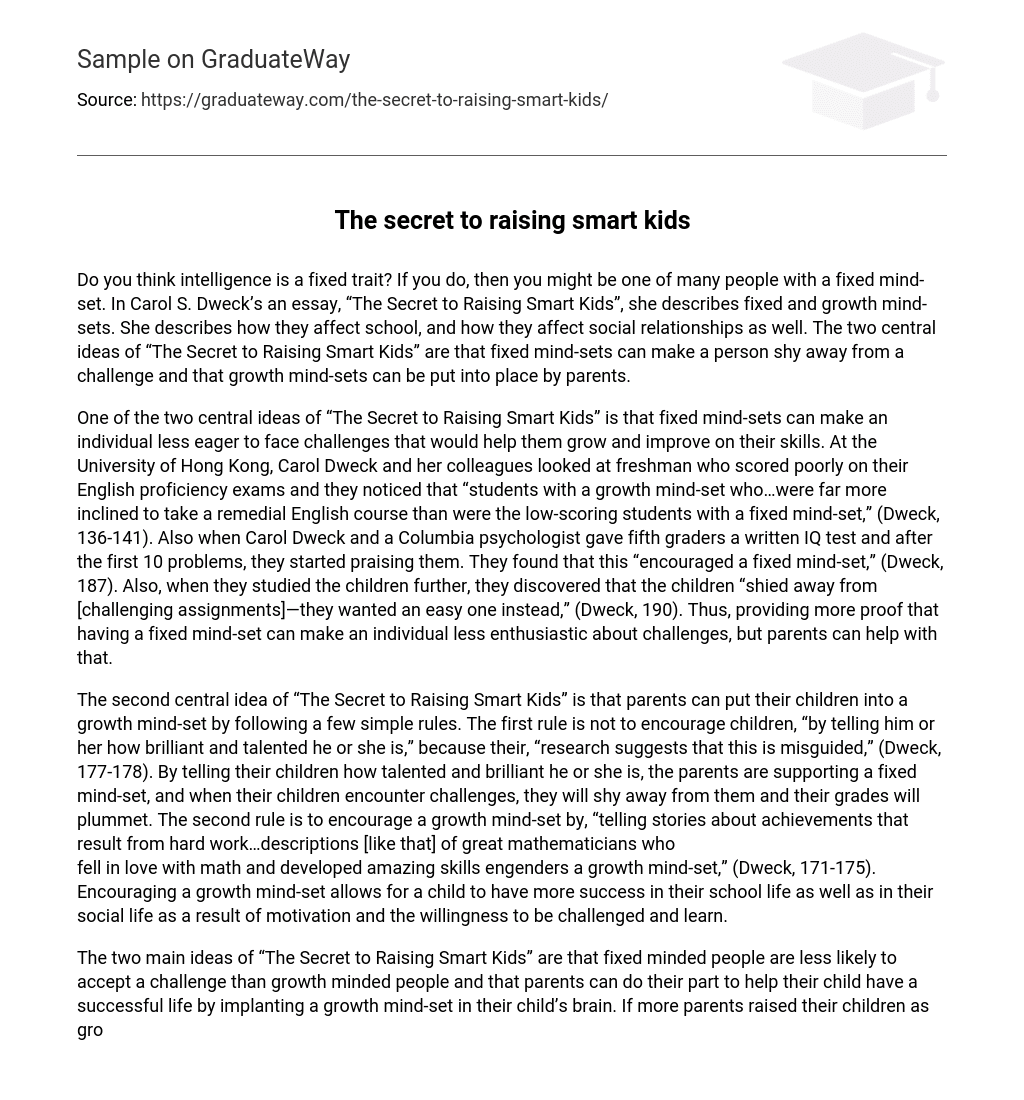Do you think intelligence is a fixed trait? If you do, then you might be one of many people with a fixed mind-set. In Carol S. Dweck’s an essay, “The Secret to Raising Smart Kids”, she describes fixed and growth mind-sets. She describes how they affect school, and how they affect social relationships as well. The two central ideas of “The Secret to Raising Smart Kids” are that fixed mind-sets can make a person shy away from a challenge and that growth mind-sets can be put into place by parents.
One of the two central ideas of “The Secret to Raising Smart Kids” is that fixed mind-sets can make an individual less eager to face challenges that would help them grow and improve on their skills. At the University of Hong Kong, Carol Dweck and her colleagues looked at freshman who scored poorly on their English proficiency exams and they noticed that “students with a growth mind-set who…were far more inclined to take a remedial English course than were the low-scoring students with a fixed mind-set,” (Dweck, 136-141). Also when Carol Dweck and a Columbia psychologist gave fifth graders a written IQ test and after the first 10 problems, they started praising them. They found that this “encouraged a fixed mind-set,” (Dweck, 187). Also, when they studied the children further, they discovered that the children “shied away from [challenging assignments]—they wanted an easy one instead,” (Dweck, 190). Thus, providing more proof that having a fixed mind-set can make an individual less enthusiastic about challenges, but parents can help with that.
The second central idea of “The Secret to Raising Smart Kids” is that parents can put their children into a growth mind-set by following a few simple rules. The first rule is not to encourage children, “by telling him or her how brilliant and talented he or she is,” because their, “research suggests that this is misguided,” (Dweck, 177-178). By telling their children how talented and brilliant he or she is, the parents are supporting a fixed mind-set, and when their children encounter challenges, they will shy away from them and their grades will plummet. The second rule is to encourage a growth mind-set by, “telling stories about achievements that result from hard work…descriptions [like that] of great mathematicians who
fell in love with math and developed amazing skills engenders a growth mind-set,” (Dweck, 171-175). Encouraging a growth mind-set allows for a child to have more success in their school life as well as in their social life as a result of motivation and the willingness to be challenged and learn.
The two main ideas of “The Secret to Raising Smart Kids” are that fixed minded people are less likely to accept a challenge than growth minded people and that parents can do their part to help their child have a successful life by implanting a growth mind-set in their child’s brain. If more parents raised their children as growth minded individuals, this world would improve significantly.
Both Carol S. Dweck and Annie Murphy Paul use the term intelligence in their essays, but they have slightly different meanings. While Carol S. Dweck uses the term intelligence as a measure of how smart someone is that can be expanded through effort, while Annie Murphy Paul uses intelligence in the same manner (a measure of how smart someone is), but in how it can be suppressed.
Carol S. Dweck uses intelligence as a form of measurement that measures how heavy of a workload someone can receive and understand, and how it can be expanded through effort. In an essay that was suggesting that growth minded people are correct, Carol Dweck says that, “[growth minded] children…think intelligence is malleable and can be developed through education and hard work.” (Dweck, 84-85).
Annie Murphy Paul uses intelligence as a form of measurement that measures how smart an individual is, and how it can be suppressed. She writes in her essay that, “the prospect of social evaluation suppressed [the black student’s] intelligence (Paul, 27-28).





